BERNSTEIN LIVE
 New York Philharmonic [10
CDs]
New York Philharmonic [10
CDs]
New York
Philharmonic $195
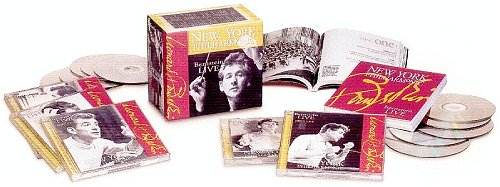
This is the fourth of the Philharmonic's boxes of archive material - concert
performances that become but a memory for the audience and a statistic on
a computer printout - now available in permanent form worldwide. I've often
wondered what a Bernstein Philharmonic concert from the 'fifties and 'sixties
was like. Now, amazingly, I know!
Despite Bernstein's hundreds of recordings, one could only imagine what must
have been some pretty heady events in Carnegie and Avery Fisher Halls - studio
recordings might not have the same fervour, and then there's the stuff Lenny
never recorded. From Schumann's overture to Manfred (14 November 1943 when
replacing Bruno Walter) to Tchaikovsky's Fourth Symphony (31 October 1989)
- neither performance in this set - Bernstein was a Philharmonic man.
So here are 10 CDs, each averaging 78 minutes - 13 hours of music. The earliest
taping is from February 1951 (the premiere, 50 or so years on, of Charles
Ives's Second Symphony); the most recent, from 1981, are pieces by Aaron
Copland and Lukas Foss. In between are lots of things Bernstein didn't record
commercially (remember that CBS also had Ormandy and Szell on its books -
not that they recorded any of the esoteric offerings here; I exclude Mathis
der Maler, one of Ormandy's studio triumphs) and some intriguing concerto
collaborations. There are also, typically for these NYP productions, two
handsome books totalling 500 pages. These embrace copious notes on the
selections, both factual and anecdotal, and Bernstein-reminiscence by NYP
members and solo artistes; there are texts and translations, a Bernstein
biography ('selected dates'), a list of orchestra personnel, a complete listing
of Bernstein/NYP recordings, plenty of pictures and - fantastic - an entire
concert schedule. I would have welcomed hearing a 1984 Rite of Spring, Walton's
Viola Concerto (Sol Greitzer) and Elgar's Enigma from 1982 (the latter played
just before Bernstein arrived in London for his BBCSO concert and DG recording)
and, from the same year, Brahms's Second Serenade. I'm curious by an entry
for a 1976 concert, the world premiere of four songs by Bernstein 'from a
work in progress', which I assume is 1600 Pennsylvania Avenue, now re-cast
(not by Bernstein) as A White House Cantata. Tempting, because not included,
are Paul Creston's Janus, David Diamond's Fifth and Eighth Symphonies and
Third Violin Concerto, Lukas Foss's Time Cycle and Phorion, and Roy Harris's
Seventh. Concertos with Heifetz, Oistrakh and Rubinstein also taunt. I would
have loved a live William Schuman Concerto on Old English Rounds - a wonderful
piece, which Bernstein did record for a CBS LP not issued in the UK and,
to date, not on CD. Let's though concentrate on what is in the set.
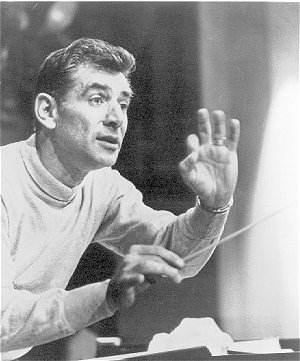
Bernstein, of course, commercially recorded most of his favoured repertoire
for CBS (now Sony), then again, mostly 'live', for Deutsche Grammophon, first
with the NYP, then adding to his American players the Israel and Vienna
Philharmonics, Concertgebouw and London Symphony orchestras. Understandably
this current selection doesn't duplicate much repertoire - notwithstanding
there's probably an amazing Beethoven, Mahler or Tchaikovsky symphony that
Philharmonic subscribers still talk about - or include any music of his own;
again, Lenny recorded most of his pieces several times.
Not surprisingly, all the tapes here from the 'fifties are mono - and there's
quite a few of these - and single-channel persists into the early 'sixties
(not specifically detailed in the documentation - 'Mono & Stereo' where
there is a mix). I'll give dates and state mono where applicable. Generally,
the recording quality is detailed and focussed if, sometimes, dynamically
limited; in collections such as this the sound is secondary to the music-making
- no-one should be disappointed with the sonics, which have been overhauled
with modern technology without orchestral frequencies being subjected to
over-coloration or distorted by excessive noise-reduction.
Bernstein: love, heart, energy, communication - he was a big man, a great
musician, one with a superb intellect that allowed him full analysis of the
music he was working on, wide-ranging in terms of reference and with the
persona to inspire something sensational in the concert-hall. He could be
inconsistent though, unpredictable, and the Philharmonic's standard of playing
may well have declined during his administration as Music Director (1958-69)
despite his keenness for detailed and painstaking rehearsals. Who knows what
might happen at a Bernstein concert?
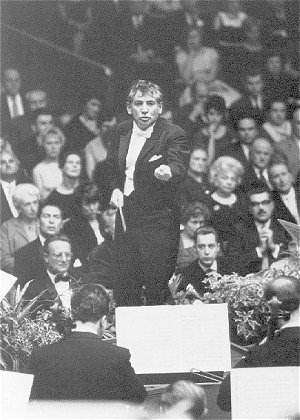
It's tempting I think to view each CD as a concert in itself - some do make
wonderful programmes and invite complete listening. Although the first CD's
opening item, a 1956 Stravinsky Song of the Nightingale, couldn't, in this
sizzling, vivid and atmospheric performance, be a finer calling-card, the
other tapings on CD1 fall into the 'interesting, glad to have heard,
but…' category. Elgar's Cockaigne Overture (1963, mono) transplants
Victorian London to bustling New York in a less than poised rendition that
may be a scramble at times but certainly explodes into life during the
marching-band episode and concludes nobly with a significant contribution
from the (ad-lib) organ. To complete the first CD is a spacious, rather aloof
Rachmaninov Third Piano Concerto with Lazar Berman (1977), which is likeable
in its refusal to barnstorm. While one appreciates Berman's quiet playing,
with a co-operative Bernstein, there is something a little too restrained
about it; no, there's a nonchalance, an inability to ignite, which seems
too consciously pre-determined. Yet Berman's poise and self-control compel
attention, but his rather unvaried sense of colour is less praiseworthy.
Somehow, outside of the atmosphere of being in the hall itself, one wonders
why the audience is so enthusiastic. (Bernstein recorded this concerto with
Alexis Weissenberg in Paris for EMI.)
CD 2 brings one of those 'concerts' I mentioned earlier. All mono, Virgil
Thomson's The Seine at Night is the 1961 'overture', a flowing, very beautiful
description of the river, with just a touch of menace I thought, and a
firefly-like iridescence at its mid-point. Enter Byron Janis for a 1960 Mozart
A major concerto (K448) with the soloist stressing the music's classical
aspects - despite a 'thumpy' left-hand at times - offering clean articulation
and shapely phrasing; though there is little, I find, truly distinguished.
Webern's Six Pieces, Op.6 (1958) follows aptly (every note matters with both
these composers) and is a fine example of Bernstein's wide embrace of music
and his control of what might be considered more cerebral music. If every
note matters in Webern, so too do slips of ensemble. This is a timely reminder
that these 10 CDs document one-off performances, not pristine studio jobs,
and need to be listened to for Bernstein's insights and a sense of occasion,
which do not necessarily invite comparative listening. To close is a marvellous
Mathis der Maler, Hindemith's opera-symphony (which Bernstein would record
many years later in Israel) played here with fizzing energy, dramatic reference,
great intensity and well-balanced textures. The 1956 sound for Mathis is
rather more open than for the Webern (the huge crescendo that closes the
funeral march - No.4 - is rather compromised).
The third CD includes a major addition to Bernstein's discography - Britten's
Spring Symphony (1963, mono). Bernstein premiered Peter Grimes in the US
but recorded little of Britten's music. The mists of the opening and the
'pain' of winter unfreezing to spring is especially vivid, the choir living
the experience. English tenor Richard Lewis is in fine voice, so too Jennifer
Vyvyan and American Regina Sarfaty knows how to put texts across, even if
it means she threatens the musical line on occasions; her English colleagues
find a better balance between declamation and musical expressiveness. Bernstein,
too energetic perhaps in certain numbers - ('The Driving Boy' - with excellent
whistling from the boys; 'When Will My May Come?' - Lewis vividly, and valiantly,
articulate) - also teases out orchestral details with a composer's instincts
(and what a fine composer Lenny was, both in the theatre and concert-hall),
charting the last movement's approach to summer with abandon - the entrance
of 'Soomer Is I-Coomen In' (sic) is swingingly affirmative.
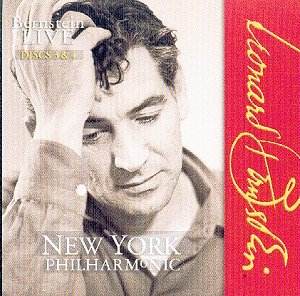
Completing this CD are two more renditions with soloists. First, an intimate
one of Schumann's Cello Concerto with Jacqueline du Pre (1967). Schumann
is among my special composers and I love the poetry of this concerto, which
is nicely conveyed by du Pre, Bernstein a tactful accompanist. I feel though
that she (then 21) wasn't fully inside the piece, or, that hers wasn't a
fully developed view at this time. There are some lovely things along the
way but this journey is also not without some undue emphasis and technical
roughness. Given she recorded it commercially (with Barenboim) and Bernstein
essayed it three times (Leonard Rose, Rostropovich and Mischa Maisky), I'm
not sure there's enough from either party to justify its inclusion here.
Following are four Sibelius songs with soprano Phyllis Curtin (1965, mono)
sung in the Swedish texts the composer set. A great Sibelius conductor (Bernstein
was of Schumann too, and Haydn, another 'special') he and Curtin revel in
the songs' Slavonic intensity and kinship with Tchaikovsky.
Other 'guest' contributions include Seymour Lipkin, an adept and lively pianist
in Stravinsky's Capriccio (1962, mono), and Bernstein himself plays harpsichord
in Bach's Fifth Brandenburg and piano in Beethoven's Triple (both 1959).
The Bach is relaxed in tempo and affectionate in phrasing (ideal!) - John
Wummer and Isaac Stern are the pliant flautist and violinist, Bernstein the
tinkly continuo until he bursts loose with the big first movement cadenza
(even if the recording doesn't fully capture the majesty that Stern remembers).
The Triple has an up-tempo opening Allegro (not unconvincing due to Bernstein
finding some moments of respite) which is more dance-like than usual. Bernstein's
clattery old piano (as recorded) finds him dextrous and impetuous; I'm not
sure that violinist John Corigliano (the contemporary composer's late father)
or cellist Laszlo Varga are entirely convinced by this bright and breezy
approach. However, the slow movement aspires to depth and the finale's Polonaise
is both exuberant and pointed. A year earlier Vladimir Ashkenazy made his
US debut with Prokofiev's Second Piano Concerto, a memorable event preserved
in decent sound that reports how tonally attractive Ashkenazy could be; he's
also in superb technical shape playing not only with fire, passion and brilliance
but also with refinement. He makes a smashing job of the huge cadenza with
Bernstein a big, but not indulgent, presence on the podium. This is one of
the highlights of the set.
So too is the remaining concerto, part of the most successful CD of all,
a superb 'concert'. Following a fleet, incident-packed Magic Flute overture,
Wilhelm Kempff plays Beethoven's Third Piano Concerto (both are from the
same 1966 programme) with a subtlety, poise, awareness for the orchestra
and a leonine grace and dramatic oratory - and his own (excellent) cadenza
I assume - that I find spellbinding. Bernstein's purposeful and accommodating
accompaniment is suggestive of a very positive relationship with the German
pianist. Yet the four performances of this concerto in October '66 were the
only time they worked together and Kempff's only engagements with the
Philharmonic. This third performance was certainly 'lucky' and is very special.
At that concert Bernstein conducted pieces by Harold Shapero and Irving Fine;
for this CD we move to 1981 for Foss and Copland. Lukas Foss's Quintets is
a real discovery. A five-note chord dominates the piece (very American in
its Coplandesque spacing of notes) but not in the space (silence) that initially
halts the flow as this chord's permutations are hauled along a 15-minute
excursion, gathering strength en route to an 'explosion' of sound (brass
fanfares of jarring jubilation). This is a great piece, Bernstein absolutely
'inside' the music of his old friend - "preparing very carefully and giving
it a real lift," to quote Foss. Copland's own Dance Symphony (which Bernstein
surprisingly didn't record commercially) is another winner, music deeply
loved by Bernstein and here shaped, coaxed and exuded very much with choreography
in mind and, perhaps, an appreciation of the Paris of the 'twenties which
seems an omnipresent feature of this urbane music.
The remaining Americana includes a stunning account of Samuel Barber's Second
Essay (1959) and an equally persuasive one of Carl Ruggles's Men and Mountains
(1958). The premiere of Ives 2 is a true collector's item. Bernstein certainly
found more in it in his two NYP recordings (and not only because he got
progressively slower, adding two minutes, then five, to the initial 38) but
there's a frisson about this belated first performance that shines through
the amazingly good sound as Lenny and the Philharmonic take Ives's quizzical
look at the German symphony (a quote from Beethoven 5 rubs shoulders with
Turkey in the Straw) at face-value.
I like William Russo's Second Symphony in this its third first performance
(18/04/59), so to speak, but I'm not sure why the stratospheric trumpet playing
of Maynard Ferguson only appears in the last movement, the symphony's weakest.
Up to then, with the Philharmonic's brass section (including Ferguson?) imitating
Stan Kenton's outfit, Russo (born 1928) displays a Hindemithian stance while
reaching-out for more popular idioms - not 'crossover' but finding a marriage
between different styles, a scherzo with 'Afro-Cuban elements' for example.
Antiphony One by Henry Brant (born 1913) is another fine piece, one embracing
Ives's radicalism and Ruggles's ruggedness (Unanswered Question meets
Sun-Treader). It's a shame that the sound is mono (1960) for Brant exploits
antiphonal effects of five different groups positioned on and around the
platform. Bernstein and his four assistant conductors make wholesome the
disparate instrumentation and placements (or is that the mono recording?)
- what emerges is a fascinating amalgam of conflict and energy that seems
ultimately to be lucidly connected. John Cage's Atlas Eclipticalis with Winter
Music (two separate pieces the composer allows combined performance of; the
piano punctuations are Winter Music I think) is 'chance music', all to do
with stars, maps, a choice of instruments (to which you can add unpitched
percussion, or not). Bernstein's (mono) performance of 9 February 1964 is
literally unique - make of it what you will, it only lasts eight minutes.
Bernstein's platform announcements for the Brant and Cage pieces are retained
as they are for Copland's An Outdoor Overture and Pithoprakta by Iannis Xenakis
(1960 and 1964 respectively, both mono). Lenny's spoken introductions are
helpful, learned and witty, confirming his stature as a natural and friendly
communicator while demonstrating his eclectic embrace of repertoire (this
the man who could analyse Beethoven to every semiquaver, improvise at the
piano in the style of almost any composer and absorb many musical styles
and put them back - Bernsteined - in his Broadway and symphonic scores).
Bernstein defies categorisation as both creator and interpreter - to
pigeon-holers and those who categorise, he must be infuriating!
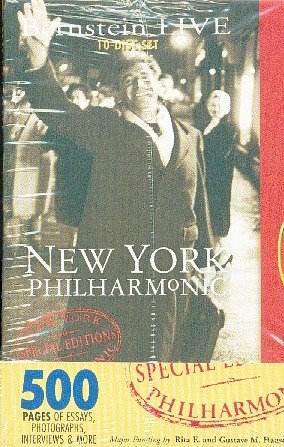
It's difficult to think of more diverse musicians (both as conductors and
composers) than Bernstein and Pierre Boulez. Both are great! I can't imagine
Boulez conducting Bernstein but it's good to have Lenny leading Pierre's
Improvisation sur Mallarme I (part two of Pli Selon Pli) with soprano Marni
Nixon (1960, mono) together with Bernstein's audience address. Boulez would
succeed Bernstein as the Philharmonic's Music Director in 1971 and it's good
to have this coming-together in this appealing rendition of music that is
more vibrant and suggestive than Boulez's detractors might imagine.
Other twentieth-century European scores include what one senses as roof-raising
but audits as a one-dimensional account of Varese's Arcana (the dullish mono
sound is not as vivid as for the Prokofiev concerto from the same 1958 concert;
Varese's blockbuster was no doubt a bit of a shaker following Vivaldi's
two-mandolin concerto!). There's a brilliant rendition of Rodion Shchedrin's
Mischievous Folk Ditties (as termed here), better know maybe as Naughty Limericks
- humorous, perhaps ironic (although it's very easy to think this with anything
Russian and contemporary with Shostakovich) with it's jazz-band drum-brushes,
honky-tonk piano and brass solos (which, here, seem to be blowing down Mexico
way!). Like Pithoprakta, Shchedrin's work is a collage of sound; his is
entertaining and smile-raising, Xenakis's exploits instruments' capacity
for sound and effect. In 1967 Bernstein responds wickedly to Shchedrin's
'entertainment', the NY Phil lapping-up the opportunity for display.
Hans Werner Henze's Fifth Symphony has an especial interest. This is the
1963 (mono) world premiere (the third of four performances) of music commissioned
for Bernstein and the Philharmonic. This is a piece that's had fair exposure
in London recently - Oliver Knussen conducted it not so long ago and Dohnanyi
will in 2001 (as part of London's celebrations for Henze's 75th birthday).
The composer's own DG recording will be familiar to anyone interested in
Henze's prolific output. It might be supposed that this dramatic, energetic
symphony - tough, closely-argued Schoenbergian invention contrasted with
lyricism and sensuous colours, rather Debussyian - was tailor-made for Bernstein.
Probably so, and the Stravinskian clarity will have sealed it for Lenny who
leads a confident, vital 'first'.
It appears that Igor Markevich, by 1958 his composing-life over, replaced
by one as a top-flight conductor, was around to hear Bernstein's precise
and dynamic account of Icare (was the composer at rehearsal?), an individual
and intriguing score. (Markevich has turned out with recent CD exposure to
be a really fine and fascinating composer; hopefully Jean Martinon will enjoy
similar coverage one day.) Icare - the familiar story of Icarus being a reckless
sun-treader (!) - another example of Stravinskian clarity, this time informing
a ballet score eventually performed as a concert item. Lashings of
(non-gratuitous) percussion and complex rhythmic ingenuity distinguish this
super piece, Markevich's musical language really quite personal - but if
you like Prokofiev, Roussel and Bartok (who wrote to Markevich congratulating
him), Icare will prove very appealing. Bernstein's (mono) performance is
fabulous (invoking premature applause at one point).
There remain a couple of slabs of German repertoire - two more major additions
to Lenny's discography: Bruckner's Sixth Symphony and scenes from
Gotterdammerung. The Wagner is a whole concert from 1970, 80 minutes worth,
not from a broadcast tape but from an 'illegal' one made by a member of the
audience - the stereo sound is very good indeed (one wonders just what equipment
Mr Roger Frank managed to smuggle into Avery Fisher Hall. A console possibly
- 'hang on Lenny, this thing needs to warm-up a few more minutes!'). Eileen
Farrell (Brunnhilde) is in fine voice - rich tone and generous phrasing;
Jess Thomas's Siegfried is not as colourful or varied, but his experience
in the role is evident. Bernstein's a luxurious Wagner conductor, he loves
these scenes to bits and is tenacious when required (and because of the source
tape, one really does feel part of the audience).
(The inclusion of this recording - with its 'present' sound - is sufficient
to wonder what other bootleg tapes might be available for CD release. I believe
that some of the Boulez era is 'lost' because the NYP was not broadcasting
then - like Sedgwick Clark (who provides the booklets' 'performance notes')
I'd love to hear Boulez conduct Copland's Connotations (and Tchaikovsky's
First Piano Concerto, or was that an April Fool?). Now if a NYP edition of
private tapes can be arranged… !)
Bernstein's Bruckner (1976) is bold and imposing with some (over-) enthusiastic
brass, and if he wasn't a natural Brucknerian (he only recorded commercially
the Ninth twice, and seems to have conducted just 6 and 9) he offers a number
of perceptions. This performance certainly has a charge to it, albeit some
crucial moments of transition are not ideally seamless (they rarely are to
be fair; I'm only fully happy with Celibidache and Solti in this respect)
but there's plenty of passion, and, of course, Lenny's musical awareness
is always apparent. The slow movement is especially good, avoiding mawkishness,
but the pushing ahead for the funeral march (from 5'15") doesn't distinguish
Bernstein from most other conductors at this crucial point. The scherzo is
a romp and the finale is, somewhat surprisingly, quite measured - to advantage.
From something I read a few years ago, I had expected to hear Bernstein conduct
Mahler's cut and re-orchestrated premiere-performance version. In the event
Bernstein plays Nowak as advertised; though like any searching and imaginative
interpreter, Lenny does it his way, certainly with regard to dynamics, retards
and lingering.
But then I hadn't expected to hear this Bruckner at all - simply an occasional
thought 'I wonder what that was like'. Now it lives again, and is live in
the best sense. For me this release's highlights are (in order of appearance):
Song of the Nightingale, The Seine at Night, Mathis der Maler, Sibelius songs,
Magic Flute overture, Kempff's Third Beethoven, Quintets, Dance Symphony,
Ashkenazy's Second Prokofiev, Icare, Second Essay, Naughty Limericks, Henze
5 and Antiphony One. I'm pleased to have heard the rest and will return to
a number of them with pleasure; only the Mozart, Rachmaninov and Schumann
concertos passed me by.
With this issue the already comprehensive picture we have of Bernstein is
generously supplemented. There's some real treasures here - the icing on
the Bernstein cake. I wonder what the Philharmonic will come up with next?
Colin Anderson
Available worldwide at select Tower Records stores, the 10-CD set with two
companion books is $195. It may also be ordered in the U.S.
and Canada by calling toll-free 1-800-557-8268. For international telephone
orders, call 1-317-781-1861. Foreign and domestic orders may also be faxed
to 1-317-781-4608. The set is available online through the Special Editions
e-STORE at www.newyorkphilharmonic.org

